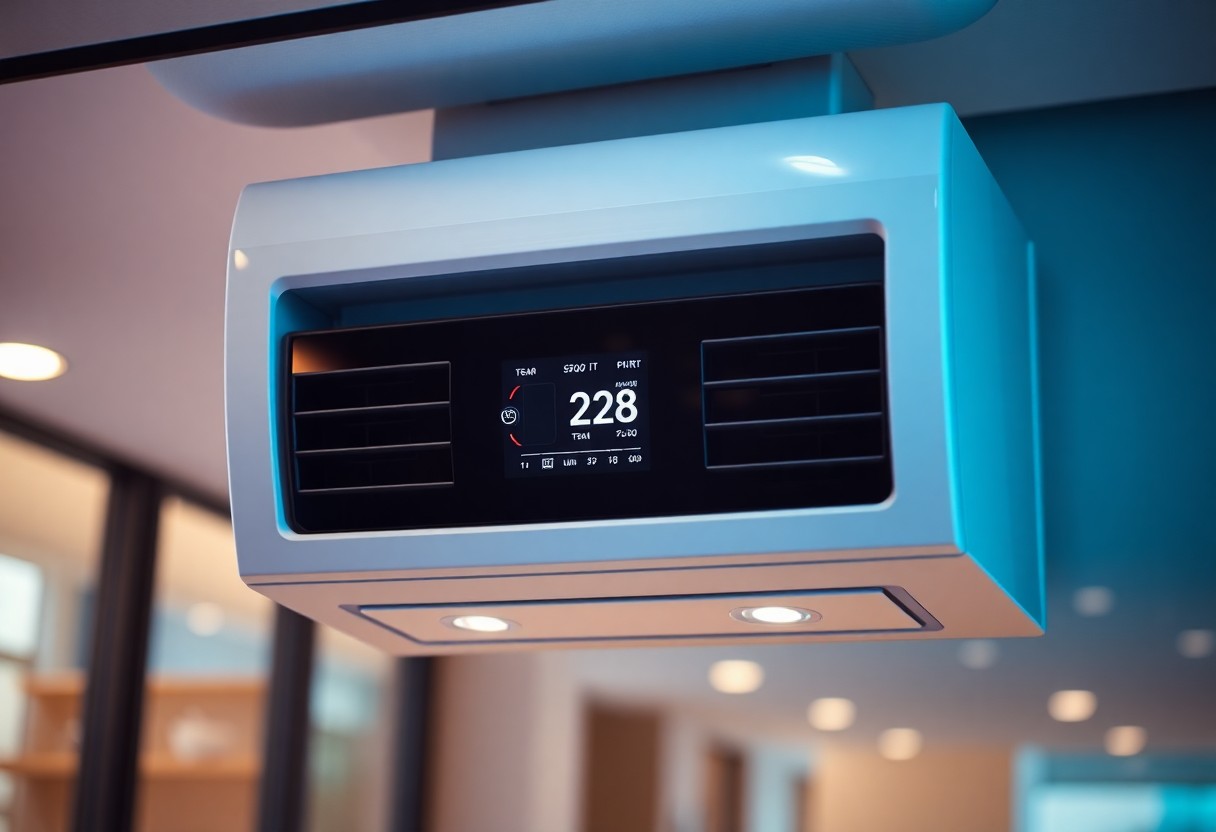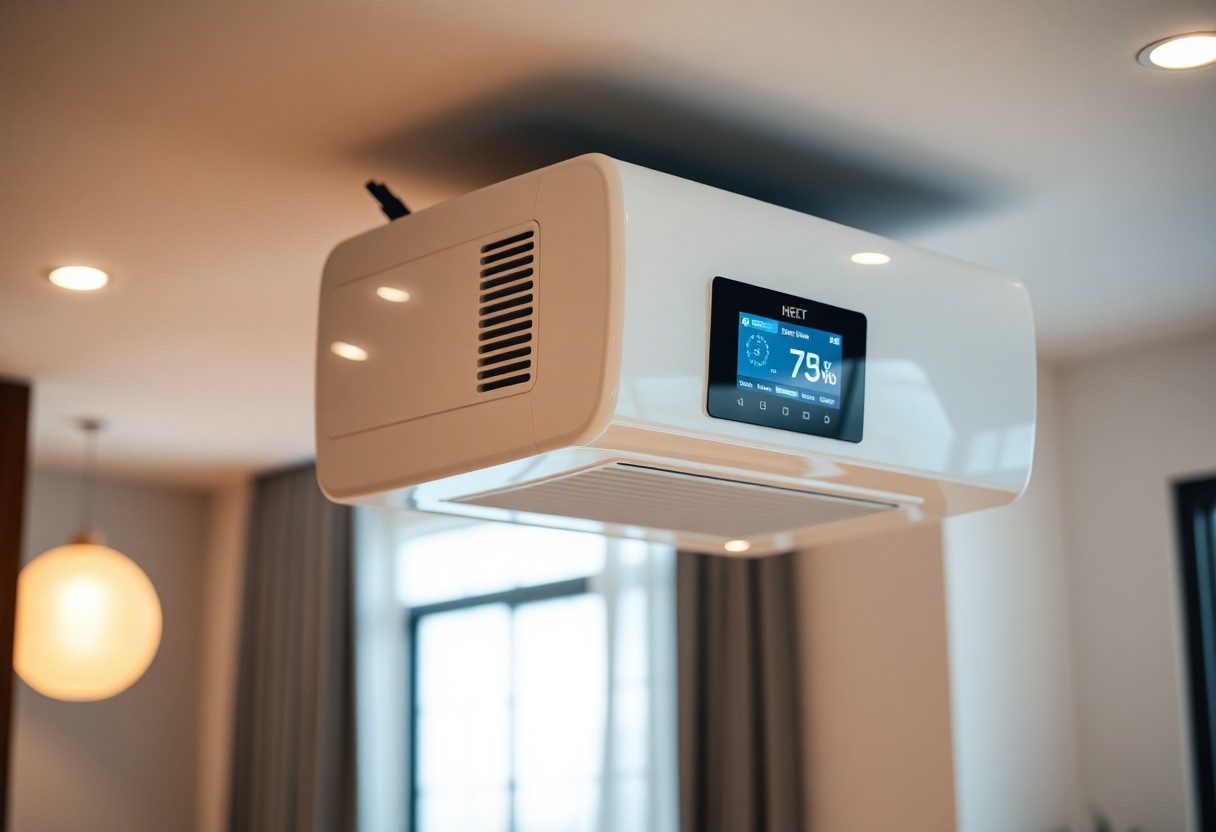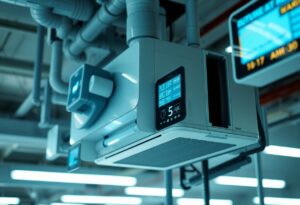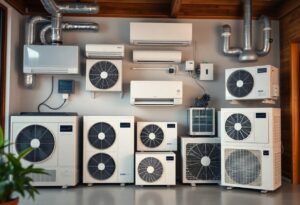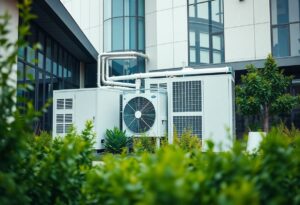Best Smart HVAC Systems: Unlock the Benefits and Worth of Investment
Just imagine transforming your home into an energy-efficient sanctuary with best smart HVAC systems This innovative technology not only enhances your comfort but also significantly reduces your energy bills. By integrating advanced controls and sensors, you can optimize your heating and cooling needs based on your lifestyle, ensuring you’re not wasting money on unnecessary energy consumption. Additionally, the real-time monitoring capabilities give you insights into maintenance needs, helping you avoid costly repairs. Invest in smart HVAC systems today, and unlock the benefits that come with improved efficiency and increased home value.
Key Takeaways:
- Best Smart HVAC systems enhance energy efficiency, leading to reduced utility bills.
- Integration with smart home technology allows for remote control and monitoring, providing convenience and flexibility.
- A programmable thermostat can optimize heating and cooling schedules based on your lifestyle, improving comfort levels.
- Advanced filters and air quality sensors contribute to better indoor air quality and health benefits.
- Investment in best smart HVAC systems can increase property value, appealing to potential buyers seeking modern amenities.
- These systems often provide predictive maintenance alerts, reducing unexpected repair costs and downtime.
- Environmental sustainability is supported through lower energy consumption and reduced carbon footprints.
Understanding Best Smart HVAC Systems
While traditional HVAC systems have served homeowners well for many years, best smart HVAC systems represent a significant advancement in home climate control technology. These innovative systems utilize sensors, advanced algorithms, and connectivity to deliver a more efficient and user-friendly experience. By integrating with your smart home devices, they allow you to monitor and adjust your heating, ventilation, and air conditioning settings remotely, ensuring optimal comfort and energy savings.
Definition and Components
One key aspect of smart HVAC systems is their integration of various components that work together to enhance energy efficiency and user convenience. These components often include smart thermostats, which learn your preferences and automatically adjust the temperature in your home and sensors that gather data on occupancy and air quality. Additionally, many smart systems are equipped with mobile applications, enabling you to control your HVAC settings directly from your smartphone or tablet, regardless of your location.
How Smart HVAC Works
On a fundamental level, smart HVAC systems operate by utilizing data and real-time analytics to optimize your home’s heating and cooling needs. They can adapt to your lifestyle, adjusting settings based on when you are home or away, ultimately leading to significant energy savings. These systems can also perform diagnostics, providing timely alerts for maintenance issues, which can help you avoid costly repairs down the line.
Smart HVAC systems continually gather data from the environment, using this information to enhance your comfort experience. They can analyze outdoor weather conditions and room occupancy patterns, enabling them to anticipate your heating or cooling requirements. Moreover, by connecting to your smart home ecosystem, these systems can sync with other devices, such as smart blinds and lights, to further enhance energy efficiency and tailor the indoor environment to your specific needs.
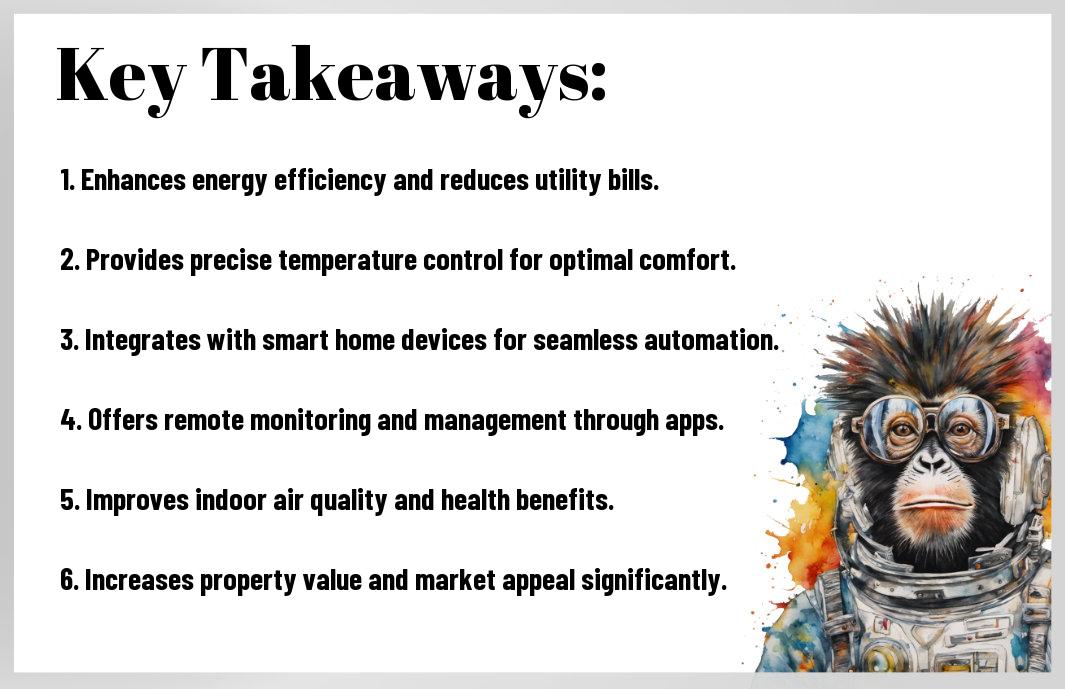
Benefits of Best Smart HVAC Systems
Some of the most significant advantages of smart HVAC systems come down to efficiency, comfort, and control. By leveraging advanced technology, these systems help you optimize your home environment without unnecessary energy expenditure. With features like programmable thermostats, energy usage reports, and learning algorithms, smart HVAC systems can adapt to your lifestyle, enabling you to save on energy costs while also contributing to a more sustainable future.
Energy Efficiency
Systems equipped with smart capabilities are designed to maximize energy efficiency. They continually analyze your usage patterns and adjust their performance accordingly. For instance, if you tend to lower the thermostat at night or ramp up heating in the morning, your smart HVAC system will learn these habits and make automatic adjustments. This not only keeps your home comfortable but also minimizes energy waste, leading to lower utility bills.
Enhanced Comfort and Convenience
Any smart HVAC system significantly enhances your home’s comfort and convenience. You can control your system remotely via smartphone apps, allowing you to adjust temperatures, set schedules, and receive maintenance reminders from anywhere. Imagine returning home to a perfectly cozy environment after a long day, without having to wait for your heater or air conditioner to catch up; that’s the convenience smart technology offers.
In addition to remote access, smart HVAC systems often integrate with other smart home devices, creating a unified environment that responds to your needs. This means you can set the temperature to adjust automatically based on the time of day, weather changes, or your personal preferences. With real-time alerts and maintenance notifications, you can also stay informed about your system’s performance, ensuring that your home remains safe and comfortable year-round.
Cost Considerations
Initial Investment vs. Long-Term Savings
Between the upfront costs of installing a smart HVAC system and the potential long-term savings it offers, you may find yourself weighing the options carefully. The initial investment can seem daunting; however, when you consider the efficiency improvements and technology advancements, you may realize that a smart HVAC system pays for itself over time. Energy savings can translate into a significant reduction in your utility bills, sometimes recouping the initial costs within a few years.
An efficient system can also lead to lower maintenance costs and fewer repairs compared to older units. With real-time monitoring capabilities, you’ll be aware of any issues before they escalate, allowing for timely intervention. Ultimately, while the initial financial outlay may be higher than traditional systems, the long-lasting energy reductions and savings on maintenance can make it a worthwhile investment.
Financial Incentives and Rebates
For those considering a smart HVAC system, it’s important to explore the various financial incentives and rebate programs that may be available to you. Many utility companies and government programs offer incentives for homeowners who invest in energy-efficient technologies. These programs can significantly reduce the burden of initial costs, making the upgrade more feasible. Additionally, some states provide tax credits or deductions, further offsetting your investment.
Considering the growing emphasis on energy efficiency and sustainability, you may discover that multiple options are available to help alleviate costs. Checking with your local utility providers can uncover specific programs that can yield substantial savings. These financial incentives can empower you to embrace cutting-edge technology while also benefiting from lower energy bills and a reduced carbon footprint, making the switch not only smart but also economically savvy.
Installation and Maintenance
Not all HVAC systems are created equal, and choosing the right one is important to maximizing your investment. After assessing your home’s size, layout, and specific climate conditions, you can determine which smart HVAC system best suits your needs. Look for systems that integrate with your existing home automation setup, ensuring compatibility with your Wi-Fi, smart thermostats, and other devices. Additionally, consider the energy efficiency ratings and the long-term cost-savings associated with each model; selecting a system with a higher SEER (Seasonal Energy Efficiency Ratio) rating can significantly lower your energy bills while enhancing comfort.
Choosing the Right System
After you’ve narrowed down the options based on compatibility and energy efficiency, it’s time to think about the installation process itself. You’ll want to work with a qualified technician to ensure that your new system is installed correctly, as improper setup can result in inefficiencies and costly repairs later on. Investigate local contractors, read reviews, and request quotes to ensure you’re choosing a partner who understands your unique needs and follows best practices in installation.
Maintenance Best Practices
For any smart HVAC system to operate efficiently, regular maintenance is vital. Develop a routine that includes changing air filters every 1-3 months, cleaning the condenser coils, and scheduling professional tune-ups at least once a year. Regular maintenance not only extends the lifespan of your system but also maintains optimal energy efficiency, which ultimately saves you money. Catalyzing this process, you can rely on smart technology to remind you of maintenance schedules, thus avoiding any lapses in care.
A proactive maintenance approach makes a strong difference in your HVAC system’s performance. Set reminders for seasonal maintenance tasks such as inspecting ductwork for leaks, checking thermostat calibration, and ensuring that exhaust vents are clear of obstructions. Additionally, consider enrolling in a maintenance program offered by HVAC professionals, which can often include discounts on parts and labor. These practices not only enhance the lifespan of your system but also ensure that you are enjoying the benefits of a consistently comfortable living environment.
Comparative Analysis
To truly understand the value of a Smart HVAC System, it’s vital to conduct a comparative analysis between traditional and smart HVAC technologies. This comparison will shed light on the advantages and innovations that smart systems bring to the table, enabling you to assess whether the investment aligns with your goals for efficiency and comfort.
Traditional HVAC vs. Smart HVAC
| Aspect | Traditional HVAC |
|---|---|
| Control | Manual thermostats with limited scheduling capabilities |
| Energy Efficiency | Generally less efficient, leading to higher utility bills |
| Maintenance | Regular manual inspections and services needed |
| Integration | Stand-alone system, no integration with other smart devices |
| Cost | Lower upfront cost but higher long-term expenses due to inefficiencies |
Case Studies and Real-World Examples
Besides the theoretical comparison, real-world examples illustrate the tangible benefits of smart HVAC systems. Analyzing case studies can provide insight into the energy savings, improvements in air quality, and overall user satisfaction that such systems can achieve. By examining these cases, you can make a more informed decision about investing in a Smart HVAC System.
- Homeowners in California: Adopted smart HVAC systems, resulting in a 30% reduction in energy bills year-over-year.
- Commercial building in New York: Integrated smart technologies, leading to an 85% decrease in operational costs related to heating and cooling.
- Retail store chain: Implemented smart controls across 100 locations, achieving an overall 15% increase in customer comfort scores.
- A Green Office Building: Utilized a Smart HVAC System to improve ventilation, resulting in a 25% decrease in employee sick days.
Studies show that businesses and homeowners alike have experienced significant advantages from investing in Smart HVAC Systems. For instance, energy-efficient models can lead to benefits that far outweigh the initial costs, showing a return on investment over time. Many users report enhanced comfort, health, and overall satisfaction in their living or working environments, with systems that easily adapt to changing conditions. By choosing smart technology, you’ve paved the way for a more sustainable and efficient future.
- Utility rebates: Many cities offer up to $1,800 in rebates when you upgrade to smart systems, reducing initial costs.
- Monitoring data: Smart HVAC Systems provide continuous monitoring, helping users save an average of 20% on energy costs annually.
- Smart home integration: Systems that connect with home automation platforms can enhance your living experience, offering improved security and convenience.
And as you consider the transition to a Smart HVAC System, it’s important to recognize the profound impacts such technological advancements can have on your daily life. With benefits that include reduced energy costs, improved environmental footprint, and enhanced comfort in your home or office, the investment is well worth it when looking at the longer-term savings and satisfaction you stand to gain.
Future Trends in Smart HVAC
Technological Advancements
Besides traditional heating, ventilation, and air conditioning functions, technological advancements in Smart HVAC systems are paving the way for improved energy efficiency and user comfort. Integration of renewable energy sources, such as solar panels, is becoming more commonplace, enabling you to harness clean energy and lower your utility bills. These systems also incorporate more sophisticated sensors that monitor air quality and adjust the HVAC operations accordingly to ensure a healthier living environment.
The rise of mobile technologies means you can control your heating and cooling systems directly from your smartphone or tablet, offering both convenience and remote monitoring capabilities. As these systems become increasingly connected, it’s necessary to stay informed about the latest innovations that can enhance your home’s energy management and occupancy comfort. You can expect to see features like predictive analytics that anticipate your needs and automatically adjust the system accordingly, making your home not just smarter but also more responsive to your lifestyle.
Impact of IoT and AI on HVAC Systems
At the forefront of the Smart HVAC revolution are the advancements in IoT and Artificial Intelligence (AI). These technologies enable your HVAC systems to collect and analyze vast amounts of data from connected devices and sensors. Consequently, this data-driven approach allows for real-time performance assessments and optimizations, which means that your system can operate at peak efficiency without requiring manual adjustments. AI algorithms can learn from your behavior, thereby automating routine tasks and ensuring consistent comfort levels throughout your home.
Consequently, incorporating IoT and AI into your HVAC system has numerous benefits, including predictive maintenance alerts that can prevent costly breakdowns. This capability not only reduces maintenance costs but also extends the lifespan of your system. Additionally, AI-driven energy management can lead to significant savings on your energy bills, as your system learns to operate during optimal times. You will also enjoy improved air quality and personalized climate adjustments, creating a more enriched living environment for you and your family. Investing in these advanced technologies positions you at the forefront of home automation, ensuring both comfort and efficiency in an ever-evolving landscape.
Conclusion
The benefits of investing in a Smart HVAC system for your home extend far beyond mere comfort. By enhancing energy efficiency, you can significantly reduce your utility bills while also contributing to a more sustainable future. The advanced technology incorporated in these systems allows for real-time monitoring and control, giving you the power to optimize your indoor climate based on your preferences and lifestyle. Additionally, many models provide predictive maintenance alerts, ensuring that you can address potential issues before they escalate, thus prolonging the lifespan of your HVAC system.
Ultimately, embracing a Smart HVAC system is an investment that pays off in various ways. From significant savings on energy costs to a more comfortable living environment, this technology adapts seamlessly to your needs. You are not just improving the quality of your indoor air but also enhancing the overall value of your property. As you consider upgrading your home, exploring the advantages of a Smart HVAC system could lead you toward a more efficient and enjoyable way of living.
FAQ
Q: What is a Smart HVAC System?
A: A Smart HVAC System is an advanced heating, ventilation, and air conditioning system that integrates smart technology to optimize climate control in buildings. It allows for remote monitoring and adjustments via smartphones or tablets, enabling users to control temperature, humidity, airflow, and energy consumption more efficiently.
Q: What are the key benefits of investing in a Smart HVAC System?
A: Investing in a Smart HVAC System offers multiple benefits, including enhanced energy efficiency leading to lower utility bills, improved indoor air quality through better filtration and humidity control, personalized comfort settings for different spaces, and remote access for monitoring and adjustments, which can also facilitate predictive maintenance to prevent costly repairs.
Q: How does a Smart HVAC System contribute to energy savings?
A: Smart HVAC Systems use advanced algorithms and data analytics to optimize heating and cooling schedules based on occupancy patterns and weather forecasts. These systems are often equipped with programmable thermostats that learn user preferences, enabling them to reduce energy usage during periods when the space is unoccupied while maintaining comfort when it is occupied.
Q: Are Smart HVAC Systems compatible with existing heating and cooling systems?
A: Many Smart HVAC Systems can be retrofitted into existing systems, including traditional units. However, compatibility can vary based on the specific technology used and the infrastructure already in place. It’s advisable to consult with a professional to determine the best options for integrating smart technology into your current setup.
Q: Is a Smart HVAC System worth the initial investment?
A: While the initial cost of a Smart HVAC System can be higher than a traditional system, the long-term savings on energy bills, coupled with increased comfort and convenience, often justify the investment. Additionally, potential tax incentives and rebates for energy-efficient systems can further offset costs, making them a financially sensible choice in the long run.
Q: What features should I look for in a Smart HVAC System?
A: When opting for a Smart HVAC System, consider features such as remote access capabilities, compatibility with home automation systems, energy usage tracking, programmable schedules, and integration with local weather data. Look for systems that provide detailed analytics and reports to better understand your energy consumption patterns.
Q: How can I ensure a successful installation of a Smart HVAC System?
A: To ensure a successful installation, hire a licensed HVAC professional with experience in smart technology. Discuss your specific needs and preferences to select the best system for your space. Proper sizing, placement of sensors, and calibration are vital for optimizing performance. Additionally, regular maintenance should be scheduled to keep the system running efficiently.
This post has been written by Team HVAC Talk Magazine. Stay informed and connected with the latest in HVAC—join us for expert advice, troubleshooting tips, and news updates. Don’t miss out, follow us now! #HVACExperts #HVACTips #StayInformed #HVACProTalk.
Learn more and join our mailing list for updates.
